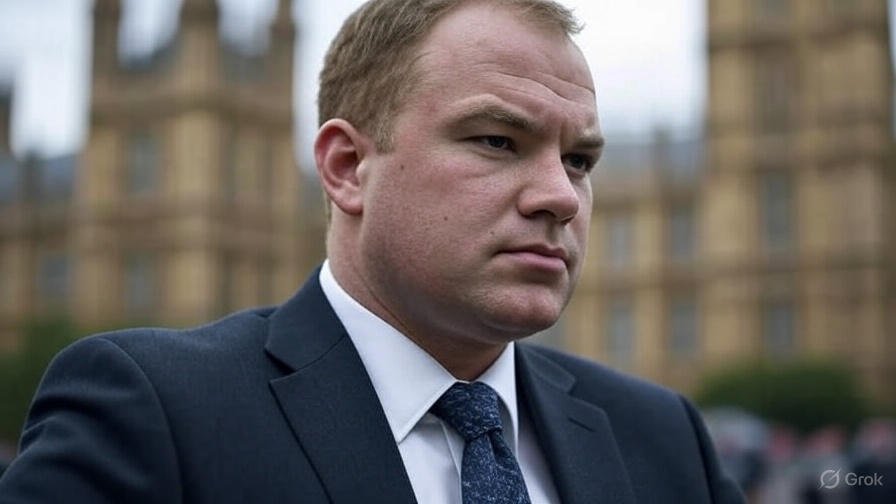Navigating the Tempest: Unpacking the Story of James McMurdock
In the often-turbulent landscape of British politics, where every elected official operates under the unforgiving glare of public scrutiny, few figures have sparked as much debate and drawn as many headlines in such a short time as James McMurdock. A Member of Parliament for South Basildon and East Thurrock, elected under the banner of Reform UK in 2024, McMurdock’s journey to Westminster has been anything but conventional. His story is a complex tapestry woven with threads of ambition, financial prowess, a dramatic entry into frontline politics, and a past that has come back to haunt his present. This extensive blog post delves deep into the multifaceted life of James McMurdock, exploring his background, his political ascent, the controversies that have defined his early parliamentary career, and the broader implications for both his future and the political party he represents.

Born around June 1986, James McMurdock embarked on a career in the high-stakes world of banking, a profession he pursued for nearly two decades. From 2007 until his election in 2024, he built a significant profile within the financial sector, holding senior director positions at prestigious institutions like Standard Chartered Bank and Barclays Capital. His expertise lay in corporate loans, with a particular focus on the energy, infrastructure, and manufacturing sectors. He even gained early experience at formidable names such as Goldman Sachs and Lehman Brothers, the latter notably collapsing in 2008. This financial background, often touted as a hallmark of his business acumen, would later become a point of contention and detailed scrutiny.
McMurdock’s foray into politics in 2024 was driven by a professed disillusionment with the established political parties. Feeling that he “didn’t like the choices in front of me as a voter,” he joined Reform UK in May 2024, reportedly paying a modest £25 to become a member and another £25 for vetting to become a candidate. What began as an agreement to be a “paper candidate” for South Basildon and East Thurrock quickly transformed into a successful, albeit narrow, victory. He became one of only five Reform UK MPs elected in the 2024 general election, with his majority being the seventh smallest in the country, and his seat being the very last to be called in England due to recounts. This unexpected triumph instantly thrust James McMurdock Learn more about his political background into the national spotlight, setting the stage for a tumultuous parliamentary debut.
The Political Spark: From Banker to Parliamentarian
The transition from the corporate boardrooms of banking to the hallowed halls of Westminster is a significant leap, one that James McMurdock embraced with characteristic vigor. His political ideology identifies broadly as conservative, advocating for a “small state” and “low tax” approach, emphasizing a desire for “government out of people’s lives” and a greater accountability of spending to taxpayers. These positions resonate strongly with the core tenets of Reform UK, a party that aims to disrupt the traditional political landscape and offer a distinct alternative to mainstream conservatism.
McMurdock’s campaign was largely unconventional, mirroring the grassroots appeal often associated with newer political movements. Acting as his own election agent, he reportedly spent only £400 on 20,000 flyers, even manually stamping them with the required sponsor information after realizing a legal oversight. His primary mode of communication with voters was notably through TikTok, where he amassed a significant following of 10,000, leveraging social media to bypass traditional media channels and connect directly with a younger demographic. This innovative, low-budget approach highlights a pragmatic and adaptable campaign style that helped James McMurdock Discover his campaign strategies secure his seat.

Upon entering Parliament in July 2024, McMurdock quickly found himself embroiled in controversy, a situation that has since overshadowed much of his initial political work. The first major revelation to surface was related to a past assault conviction. Details emerged that in 2006, at the age of 19, he had been convicted of assaulting his then-girlfriend outside a nightclub in Chelmsford. Court records, later brought to light by media investigations, contradicted his initial downplaying of the incident as merely a “push,” revealing that he had received a custodial sentence for “kicking” the victim “around four times” and spent 21 days in a young offenders’ institution. This conviction, which he had not publicly disclosed before his election, sparked immediate accusations of misleading the public and calls for his removal from political opponents.
His response to these revelations has been varied, oscillating between expressions of deep regret and attempts to contextualize the incident as a “teenage indiscretion.” He publicly apologized, calling it his “biggest regret” and asserting that it led him to “turn his life around.” However, the discrepancy between his narrative and court records, along with the victim’s mother’s statements, continued to fuel the controversy. This incident quickly became a defining feature of James McMurdock’s Read more about the conviction details public image, casting a long shadow over his political aspirations.
The Weight of the Past: Scrutiny and Allegations
The revelation of James McMurdock’s assault conviction was merely the opening act in a series of controversies that have plagued his early parliamentary tenure. Following closely on the heels of the assault allegations, scrutiny turned to his professional background, specifically the claims made on his LinkedIn profile and in his Reform UK biography. Investigations by outlets like Byline Times brought forth allegations that he had “lied” to voters by inflating his career history.
Concerns were raised about his claimed experience at Lehman Brothers, a firm that famously collapsed in September 2008, while McMurdock would have been just entering his second year at university. Questions also arose regarding the brevity of his stint at Goldman Sachs (reportedly only a couple of months) and the nature of his role at Standard Chartered Bank. While he had described his role at Standard Chartered as a “portfolio manager,” a former colleague alleged that he served in a more junior, administrative capacity as a “deal administrator,” handling routine tasks for already agreed loans rather than structuring financial facilities. This disparity between his self-description and the accounts of former colleagues fueled further accusations of misrepresentation. The veracity of James McMurdock’s Explore claims of CV discrepancies became a major talking point.

The controversies surrounding James McMurdock extended beyond his personal past and professional claims to include questions about his business dealings. Investigations unearthed a trail of failed companies associated with him, with some firms being technically insolvent or facing compulsory strike-off action due to overdue accounts. These findings added another layer of complexity to his public persona, raising questions about his judgment and financial stewardship. The use of different versions of his name across various company listings also made tracing his director roles more challenging, albeit not an offense in itself.
In July 2025, amidst mounting pressure from these business-related allegations that predated the general election, McMurdock resigned the Reform UK party whip, effectively becoming an independent MP. This move marked a significant development in his political career, distancing him, at least officially, from the party that brought him to power. This resignation underscores the severe impact that the ongoing controversies have had on his standing and highlights the challenges faced by new MPs when their pre-political lives come under intense public scrutiny. The unfolding situation for James McMurdock Find details on his resignation from Reform UK continues to be a subject of keen political interest.
The Broader Implications: A Test for Accountability
The story of James McMurdock serves as a potent case study on the evolving demands of public accountability in modern politics. In an age of instant information and relentless media scrutiny, the past lives of public figures are increasingly laid bare, often with significant consequences. For a party like Reform UK, which often positions itself as an anti-establishment force advocating for integrity and transparency, McMurdock’s controversies present a unique challenge. While the party initially stated they were aware of his past conviction and considered it “spent,” the subsequent revelations and the sheer volume of critical attention ultimately led to his resignation of the whip. This demonstrates the fine line political parties must walk between supporting their members and maintaining public trust.
The ongoing debate surrounding McMurdock’s eligibility to serve as an MP, particularly in light of his assault conviction, also reignites broader discussions about rehabilitation, second chances, and the standards expected of elected representatives. While some argue that a past mistake, particularly one from nearly two decades ago, should not permanently disqualify an individual from public service, others contend that the nature of the offense and the alleged lack of full disclosure are critical factors that undermine public confidence. The legal nuances of a “spent conviction” versus the ethical expectations of transparency for a public office holder remain a central tension in this narrative. The future career trajectory of James McMurdock Explore discussions on MP conduct and past convictions will undoubtedly be watched closely.

Ultimately, the trajectory of James McMurdock’s political career remains uncertain. His departure from the Reform UK whip marks a significant turning point, forcing him to navigate the complexities of being an independent MP in a highly partisan environment. The controversies have undoubtedly damaged his public image and raised questions about his suitability for office. However, his initial electoral success, albeit by a slim margin, suggests a segment of the electorate was receptive to his message. How he chooses to address the ongoing allegations, whether he can rebuild trust with his constituents, and if he can carve out a meaningful role for himself in Parliament as an independent will be key determinants of his long-term political viability. His story is a powerful reminder that in the arena of public service, transparency and accountability are not just buzzwords, but essential pillars of legitimacy.